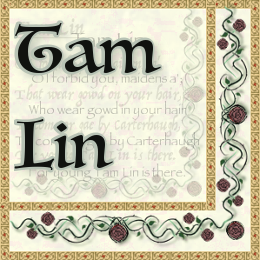Summary
Thomas tells of how he was taken from his own land and traveled with the Queen of fairies after his father gave him to her. As they travel, she instructs him what he can and cannot eat, and of the paths to heavan and hell around him. Finally, he tells of winning a contest in the Elfan land. Also there were young ladies. Finally, he tells Janet that while he's happy to remain with the faeries, they also pay a toll to hell. If she cannot capture him the next night, he's lost for seven years.
Tam Lin:
- My father was a noble knight,
And was much gi'n to play,
And I myself a bonny boy,
And followed him away. - "He rowd me in his hunting-coat
And layd me down to sleep,
And by the queen of fairies came,
And took me up to keep. - She set me on a milk-white steed;
'It was o the elfin kind;
His feet were shot wi beaten good,
And fleeter than the wind. - Then we raid on and on'ard mair,
Oer mountain, hill and lee,
Till we came to a hie, hie wa,
Upon a' mountain's bree. - The apples hung like stars of goud
Oh-our that wa sa fine;
I put my hand to pu down ane,
For avant of food I thought to tine. - O had your hand, Tamas" she said,
I'd let that evil fruit now be!
It was that apple ye see there
Beguil'd man and woman in your country. - O dinna ye see yon road, Tamas,
Down by yon lilie lee?
Blessd is the man who yon gate gaes,
It leads him to the heavens hie. - 'And dinna ye see yon road, Tamas,
Down by yon frosty fell?
Curst is the man that yon gate gaes,
For it leads to the gates of hell. - "O dinna ye see yon castle, Tamas,
That's biggit between the twa,
And theekit wi the beaten goud ?
O that's the fairies' ha. - 'O when ye come to the ha, Tamas,
See that a weel-learnd boy ye be;
They'll ask ye questions ane and a',
But see ye answer nane but me. - "If ye speak to ain but me, Tamas,
A fairie ye maun ever bide;
But if ye speak to nane but me, Tamas,
Ye may come to be your country's pride.' - And when he came to Fairie Ha,
I wot a weel-learncl boy kvas he;
They askd him questions ane and a',
But he answerd nane but his ladie. - There was four-and-twenty gude knights'-sons
In fairie land obliged to bide,
And of a' the pages that were there
Fair Tamas was the ladie's pride. - There was four-and-twenty earthly boys,
Wha all played at the ha,
But Tamas was the bonniest boy,
And playd the best amang them a'. - There was four-and-twenty earthly maids,
Who a' playd at the chess,
Their colour rosy-red and white,
Their gowns were green as grass. - "And pleasant are our fairie sports,
We flie o'er hill and dale;
But at the end of seven years
They pay the teen to hell. - "And now's the time, at Hallowmess,
Late on the morrow's even,
And if ye miss me then, Janet,
I'm lost for yearis seven.'
Version Notes
Why version 12b: This version is a fairly fragmented and corrupted version of Tam Lin, and portions have been incorporated into the version called Child's Notes. Child's Notes contained more complete verses than some of the fragments that were assigned letters, and I felt that one version on the website to account for this was a reasonable solution.
From Child's notes:
Communicated to Scott by Major Henry Hutton, Royal Artillery, 24th December, 1802, as recollected by his father and the family: "Letters I, No 77. Major Hutton intimates that stanzas 46-49 of the first edition of 'Tarniane' ('Roxburgh was my grandfather,, ff., corresponding to I28-32) should be struck out, and his verses inserted. But 4-12 of Hutton's stanzas belong to Thomas Rymer.
Added to site: October 1997
